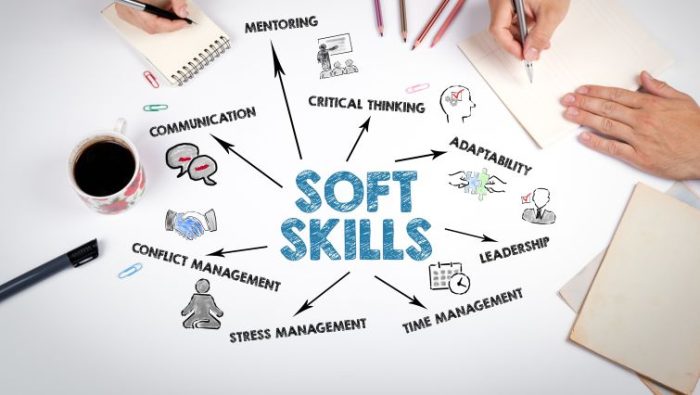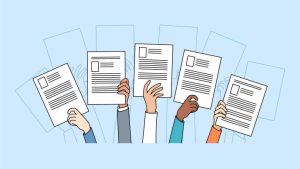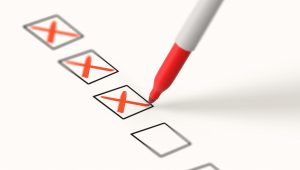How to Showcase Soft Skills on Your Resume
 Publié le 12 August 2024
Publié le 12 August 2024
Make sure hiring managers know you’ll be ready on the first day of work by knowing how to showcase soft skills on your resume.
Soft skills can set you apart from other job candidates. By adding soft skills to your resume, you demonstrate that you can work well with others, remain agile, and contribute positively to the workplace.
Let’s take a closer look at what soft skills are and why they matter to employers and hiring managers. We’ll also share three ways you can include them on your resume.
What are soft skills?
Soft skills are non-technical skills related to how you work, communicate, and interact with others. Soft skills are different from hard skills, which are specific technical abilities required for particular jobs. Some valued soft skills include communication, teamwork, adaptability, and problem-solving.
Types of skills you might include on your resume
- Sound decision-making
- Emotional intelligence
- Stress management
- Time management
- Interpersonal skills
- Conflict resolution
- Attention to detail
- Problem-solving
- Communication
- Critical thinking
- Active listening
- Collaboration
- Adaptability
- Negotiation
- Networking
- Leadership
- Resilience
- Teamwork
- Creativity
- Flexibility
- Empathy
- Positivity
Why do soft skills matter on your resume?
Soft skills matter on your resume because they reveal your personality, work ethic, and team compatibility. Employers value strong soft skills because they foster a positive work culture, better collaboration, and increased productivity.
Including soft skills on your resume shows recruiters your potential beyond technical abilities.
4 benefits of soft skills in the workplace
Here are some of the top soft-skill benefits employers value:
1. Empathetic workforce
Empathy and interpersonal skills help form positive workplace relationships and a supportive organizational culture.
Empathetic leaders and colleagues create an environment where individuals feel valued, understood, and respected. This fosters trust, collaboration, and psychological safety, supporting teams to thrive and innovate together.
2. Improved collaboration
Teamwork skills and collaboration promote synergy within teams. This encourages camaraderie and shared responsibility.
It may also enhance creativity, problem-solving, and team performance.
3. Better communication
Strong soft skills, like communication, reduce misunderstandings, streamline workflows, and help align teams toward common objectives.
Effective communication cultivates a positive work environment where employees can freely share and exchange ideas.
4. Adaptability
Employees with soft skills, like problem-solving, can navigate challenges and uncertainties in the workplace. They analyze situations, identify solutions, and adapt quickly to changing circumstances.
This agility helps teams address complex problems and remain resilient in dynamic environments.
4 ways to showcase soft skills on your resume
Here’s how to include your soft skills throughout your resume:
1. In your bio
Include a brief bio or summary statement at the top of your resume highlighting relevant skills for the job you’re applying for.
For example, if you’re applying for a leadership role, you might write: “Adaptable team leader with excellent communication skills and a knack for problem-solving.”
Or if you’re applying for a product design role, you might write: “Product designer with creative thinking skills and pristine time management.”
Be sure to also add the following near your bio:
- A professional headshot
- Contact information, such as your email address and phone number
- Relevant URLs, such as your website address or portfolio URL
2. In job descriptions
Incorporate soft skills into your job descriptions by highlighting experiences where you demonstrated these abilities.
Here are some specific examples to help inspire you:
- “Collaborated effectively with cross-functional teams to achieve project milestones, showcasing strong teamwork and interpersonal skills.”
- “Resolved customer inquiries promptly and effectively, demonstrating exceptional communication and problem-solving skills.”
- “Led team meetings and facilitated productive discussions to brainstorm solutions, showcasing strong leadership abilities.”
- “Adapted quickly to new software systems and trained team members on usage, highlighting flexibility and teaching skills.”
- “Negotiated contracts with vendors to secure favorable terms, showcasing strong negotiation and interpersonal skills.”
- “Managed multiple competing priorities and deadlines with ease, demonstrating excellent time management and organizational abilities.”
- “Mentored junior team members, providing guidance and support to foster their professional development, highlighting leadership and mentoring capabilities.”
- “Identified inefficiencies in existing processes and implemented improvements, demonstrating critical thinking and problem-solving skills.”
- “Acted as a liaison between departments to guarantee effective communication and coordination, highlighting strong interpersonal and communication skills.”
3. In the skills section
Dedicate a section of your resume to listing specific soft skills, providing concrete examples whenever possible.
Here’s an example:
Soft skills
Communication: Effectively communicate project updates to stakeholders through clear, concise emails and presentations.
Leadership: Led a team of five in implementing a new process, demonstrating strong leadership and decision-making skills.
Teamwork: Collaborated closely with cross-functional teams to develop and launch a new product. This led to successful project completion that was ahead of schedule.
Adaptability: Adapted quickly to changes in project scope and priorities. Remained flexible and resilient during tight deadlines and shifting project requirements.
Problem-solving: Identified and resolved technical issues during software implementation. This led to a seamless transition and better system performance.
*Pro-Tip: Ask previous employers for testimonials that highlight your top soft skills. Add these to a “Testimonials” section at the end of your resume.
4. In resume attachments
Consider attaching a cover page to your resume that includes more about your soft skills — or go the extra mile and provide case studies.
For example, if you helped a client generate more website traffic and conversions, create a case study that explains the problem, how you solved it, and the end result. Include pie charts, charts, graphs, and screenshots as visual proof to build trust and crystallize your process.
Wrap up
Soft skills help teams communicate, problem-solve, and collaborate. Think of them as people skills (or social skills).
You can showcase your soft skills on your resume by including them…
- In your bio or summary statement: Highlight key soft skills relevant to the job you’re applying for, such as teamwork, communication, and adaptability.
- In job descriptions: Incorporate examples of how you’ve demonstrated soft skills in previous roles, such as leading teams, resolving conflicts, or adapting to changes.
- In the skills section: Dedicate a section of your resume to list specific soft skills, providing concrete examples whenever possible.
- In resume attachments: Include additional materials like case studies or cover letters that demonstrate your soft skills in action, such as successful project outcomes, leadership initiatives, or collaborative efforts.
PS: Need help finding your next Canadian job? Use our finder now to get matched with the perfect employer for your skill set and goals.
That’s it for now. Here’s to your success!







